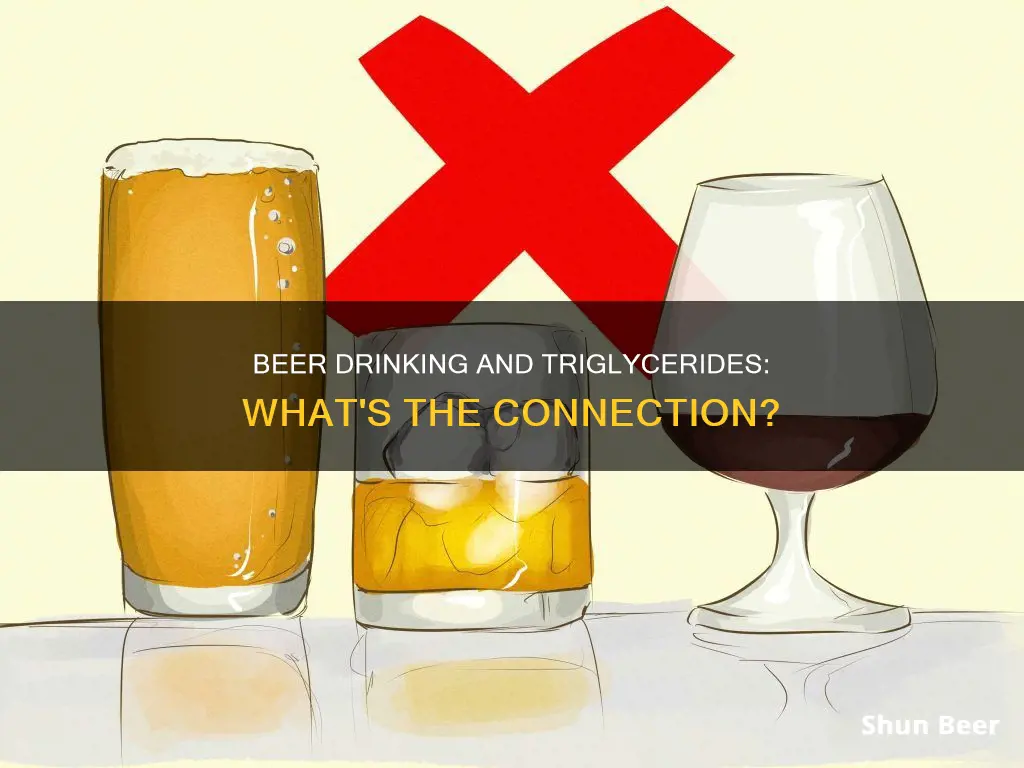
Beer is one of the most popular alcoholic beverages in the world. While drinking beer in moderation may have some health benefits, excessive alcohol consumption can negatively impact your health in several ways. One of the potential adverse effects of drinking beer is its influence on triglyceride levels in the body. Triglycerides are fats that circulate in the blood, and elevated levels can increase the risk of cardiovascular disease. Research shows that drinking alcohol, even in small amounts, can increase triglyceride levels. This is because alcohol boosts calorie intake, and any excess calories that are not used for energy are converted into triglycerides. Additionally, alcohol consumption is often accompanied by the intake of fatty foods and sugary drinks, which also contribute to higher triglyceride levels. While moderate beer consumption may not significantly impact triglyceride levels, excessive drinking can lead to a combination of high triglycerides and low HDL (good) cholesterol, which is a risk factor for heart disease.
| Characteristics | Values |
|---|---|
| Does drinking beer raise your triglycerides? | Yes, drinking beer can raise your triglycerides. |
| Amount of beer | Even small amounts of beer can increase triglyceride levels. |
| Other factors | Beer may increase triglyceride levels indirectly by increasing consumption of fatty foods, fruit juices, or soft drinks that are high in sugar and calories. |
| Beer and cholesterol | Beer may increase "good" cholesterol (HDL) but does not decrease "bad" cholesterol (LDL) or triglycerides. |
| Health risks | High triglyceride levels can increase the risk of heart disease, coronary artery disease, and fatty liver disease. |
| Recommendations | Most experts recommend reducing alcohol intake or abstaining from alcohol to improve triglyceride levels and lower health risks. |
What You'll Learn

Beer can increase HDL cholesterol levels
A 2018 study published in Nutrients found that the moderate consumption of beer in overweight adults (30 grams of alcohol per day for males and 15 grams per day for females) increased HDL levels after four weeks. The study also found that consuming beer in this amount did not significantly alter liver function or contribute to the stiffening of arteries, a risk factor for high blood pressure and CAD.
Similarly, a 2020 review of 26 high-quality studies in PLoS One concluded that the low to moderate consumption of beer increases HDL levels but has no effect on LDL or triglycerides. The review also suggested that beer may increase the flexibility of blood vessels, thereby reducing blood pressure and the risk of CAD.
However, it is important to note that the potential benefits of beer consumption do not outweigh the risks of drinking alcohol. Excessive alcohol consumption can increase the risk of heart disease, stroke, high blood pressure, liver disease, cancer, and other serious health problems. As such, it is not recommended to start drinking beer or any other alcoholic beverage specifically to lower cholesterol or improve heart health.
Drinking Alcohol-Free Beer: Publicly Legal or Not?
You may want to see also

Excessive alcohol consumption can lead to high triglyceride levels
Alcohol is broken down and rebuilt into triglycerides and cholesterol in the liver. Excessive alcohol consumption can lead to high triglyceride levels in the blood. This is because any excess calories that aren't immediately used for energy are converted to triglycerides.
Drinking alcohol can also increase the consumption of other foods and drinks that increase triglycerides. For example, people who drink a lot of alcohol are more likely to eat lots of fatty foods, and soft drinks mixed with alcohol are high in sugar and calories.
Excessive alcohol consumption not only increases triglycerides but also increases the likelihood of liver problems, high blood pressure, certain cancers, and other health problems. High alcohol intake may also increase the risk of metabolic syndrome, a cluster of conditions that raises the risk of heart disease, stroke, and diabetes.
If you have high triglyceride levels, it is important to re-evaluate your alcohol intake. Most experts recommend that for the best heart health, you may need to reduce the amount you drink or consider not drinking alcohol altogether.
Research has shown that moderate alcohol consumption may lower the risk for heart disease in adults. A few studies have found that people who drink alcohol in moderation have lower rates of heart disease and might even live longer than those who abstain. However, excessive drinking can increase the risk for heart disease and stroke, raise blood pressure, contribute to obesity, and increase the levels of fats called triglycerides in the blood.
The American Heart Association does not recommend that people start drinking wine or any other alcoholic beverages specifically to lower their cholesterol or improve their heart health. Instead, the organization advises watching your weight, eating a healthy diet, and exercising regularly to keep your cholesterol levels in check.
Drinking Beer in Vondelpark: What You Need to Know
You may want to see also

Alcohol can increase the risk of fatty liver disease
The liver breaks down most of the alcohol consumed, facilitating its removal from the body. However, this breakdown process generates harmful substances that can damage liver cells, promote inflammation, and weaken the body's natural defences. The more alcohol consumed, the greater the damage to the liver.
AFLD progresses in stages, starting with an enlarged liver, which often shows no symptoms but can cause upper belly pain or discomfort. If alcohol consumption continues, the condition can advance to alcoholic hepatitis, characterised by swelling in the liver, resulting in fever, nausea, vomiting, abdominal pain, and jaundice. The final stage is alcoholic cirrhosis, a buildup of scar tissue in the liver, which can lead to life-threatening liver failure.
The treatment for AFLD involves stopping alcohol consumption, which can help undo some of the liver damage. In severe cases, a liver transplant may be necessary.
Beer and Vitamins: Can They Mix?
You may want to see also

Drinking alcohol can cause weight gain
Alcoholic beverages, including beer, are known to be high in calories. A standard 12-ounce beer contains around 150 calories, and craft beers or ales can contain even more. When consumed in excess, these extra calories can contribute to weight gain. Additionally, alcohol is often consumed alongside high-calorie snacks or meals, further increasing the calorie intake.
Drinking alcohol can also increase your appetite and lead to overeating. Alcohol affects the areas of the brain that control hunger and satiety, making you feel hungrier and less full than you usually would. This can result in consuming more food and calories than your body needs, leading to weight gain over time.
Another way alcohol can contribute to weight gain is by impairing judgment and lowering inhibitions. This can make it easier to make unhealthy food choices, such as opting for high-calorie, high-fat snacks or meals. Alcohol can also lead to late-night food cravings, causing you to eat when you normally wouldn't.
Finally, alcohol can slow down your metabolism. Your body treats alcohol as a toxin, and the process of metabolizing it takes priority over other functions, including burning fat. This means that when you drink alcohol, your body may store more fat than it would otherwise, leading to weight gain.
It's important to note that the impact of alcohol on weight gain can vary depending on several factors, including the amount and frequency of alcohol consumption, as well as individual differences in metabolism and lifestyle. However, if you're concerned about maintaining a healthy weight, it's advisable to moderate your alcohol intake and prioritize healthy eating and regular physical activity.
Beer and Braces: What You Need to Know
You may want to see also

Alcohol can increase the risk of heart disease
Alcohol can have both positive and negative effects on the cardiovascular system. While some studies have shown that moderate alcohol consumption may lower the risk of heart disease, heavy drinking is linked to a number of poor health outcomes, including heart conditions. Excessive alcohol intake can lead to high blood pressure, heart failure, stroke, and cardiomyopathy. It can also contribute to obesity and increase the levels of fats called triglycerides in the blood.
The American Heart Association does not recommend drinking wine or any other alcoholic beverages specifically to lower cholesterol or improve heart health. Instead, they advise watching your weight, eating a healthy diet, and exercising regularly.
The effects of alcohol on the cardiovascular system are complex and depend on various factors such as dose, pattern of consumption, gender, age, and individual susceptibility. Low-to-moderate alcohol consumption may provide some benefits, but heavy drinking and binge drinking increase the risk of heart disease and other negative health outcomes.
The World Health Organization states that "no level of alcohol is safe for our health," and it is essential to consider the potential risks and benefits when making decisions about alcohol consumption.
Beer and Golo: What You Need to Know
You may want to see also
Frequently asked questions
Yes, drinking beer can raise your triglycerides. Alcohol boosts your calorie intake, and excess calories that aren't used for energy are converted into triglycerides.
Triglycerides are a type of fat found in the blood. High levels of triglycerides can increase the risk of heart disease and coronary artery disease.
It is recommended that men have no more than two drinks per day and women have no more than one drink per day.
Some studies suggest that low to moderate consumption of beer may have some health benefits, such as increasing levels of "good" cholesterol (HDL) and reducing the risk of heart disease. However, it is important to note that excessive alcohol consumption can lead to serious health problems.
Excessive alcohol consumption can increase the levels of triglycerides and cholesterol in the blood, contribute to weight gain and high blood pressure, and increase the risk of liver disease, cancer, and other health problems.







